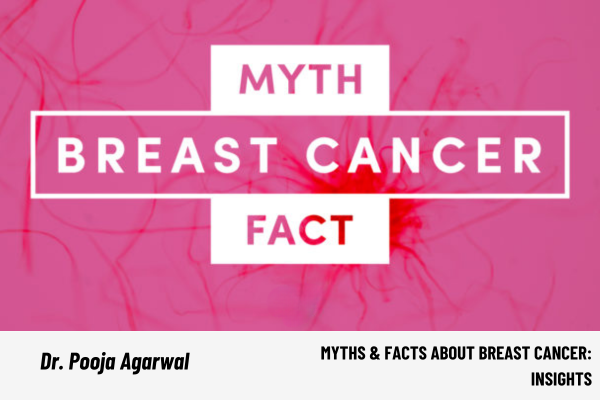Breast cancer is surrounded by numerous myths that can create confusion and fear. Dr. Pooja Agarwal, a renowned breast cancer surgeon in Kolkata, debunks some common myths and provides the facts to help you stay informed and proactive about your health.
Myth 1: Only Women Can Get Breast Cancer
Fact: While breast cancer is significantly more common in women, men can also develop the disease. It is essential for everyone to be aware of the symptoms and consult a doctor if they notice any unusual changes.
Myth 2: A Lump in the Breast Means Cancer
Fact: Not all lumps are cancerous. Many breast lumps are benign and caused by conditions such as cysts or fibrocystic changes. However, any new lump should be evaluated by a healthcare professional to rule out cancer.
Myth 3: Wearing Underwire Bras Causes Breast Cancer
Fact: There is no scientific evidence linking the use of underwire bras to an increased risk of breast cancer. Cancer risk is influenced by genetic, hormonal, and lifestyle factors, not by clothing choices.
Myth 4: Family History Is the Only Risk Factor
Fact: While family history can increase the risk, most women diagnosed with breast cancer have no family history of the disease. Other factors, such as age, reproductive history, and lifestyle, also play a significant role.
Myth 5: Mammograms Are Painful and Unsafe
Fact: Mammograms can be uncomfortable but are generally not painful. They are a safe and effective screening tool that can detect breast cancer early when it is most treatable. Regular screenings are crucial for early detection.
Myth 6: Healthy Lifestyle Guarantees No Breast Cancer
Fact: While a healthy lifestyle can reduce the risk, it does not eliminate the possibility of developing breast cancer. Regular screenings and self-examinations are essential, regardless of lifestyle.
Conclusion
Understanding the facts about breast cancer can lead to better prevention, early detection, and treatment. Dr. Pooja Agarwal emphasizes the importance of staying informed and consulting healthcare professionals for accurate information and regular screenings. By debunking these myths, we can promote awareness and proactive health management.

